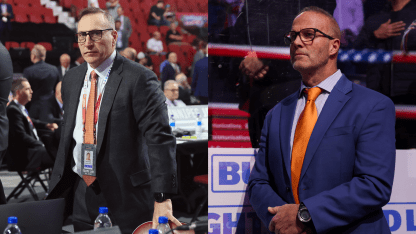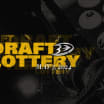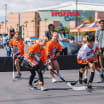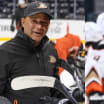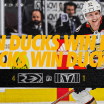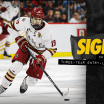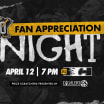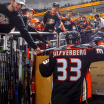The Ducks have officially closed the book on the 2023-24 season and have turned their sights towards the fall.
Following the team's exit meetings Monday morning at Great Park Ice, general manager Pat Verbeek and head coach Greg Cronin each spoke with local media to share their thoughts on Anaheim's season, the growth of its young core and a busy summer aimed to building a roster fit for playoff contention.
Pat Verbeek
On upgrading the roster
Obviously the easiest way to go about this is to look at the free agent market. Now, am I closing off any opportunities as far as trade? No. I'm looking, not closing that off either. So we're going to explore multiple ways of how to accomplish that. I've also talked about having a improvement in our bottom-six forwards as well. I'm looking for more speed, a little more grit to add to our lineup in the bottom half. And then I'm also looking for a top-four defenseman. So are those are the kind of areas I'm looking to make improvements to the team.
On acquiring a top-four defenseman
If you look at our lineup, we have a lot of left shots. So I'm looking for a right shot defenseman.
On Greg Cronin
I've got a super long time for Greg Cronin. Got a lot of respect for him. Very competitive, very passionate guy. Love his approach to life and his approach to our hockey team. I'm very happy with the job that he did this year. There were a lot of things that were positive. Guys had career years and we certainly improved our competitiveness, our work ethic and the overall culture has taken big strides. Do we still have work to do? Yes, we do, but overall I'm very happy from that aspect.
On the bottom-six
There are a couple different elements. Obviously, successful playoff teams have a good distribution of scoring from their bottom six forwards. Just take a look at Vancouver. I mean they've got guys that, and there's other teams as well that you can look at that their bottom six forwards are contributing and helping the top six forwards when it comes to having to perform under pressure all the time to provide that scoring. Obviously we need to score more goals overall as well to be able to help our team win more hockey games. So I'm looking from that aspect as well.
On the team's growth
I think I'm looking at doing little things incrementally in the sense that, and so it's not going to happen all at once. I have to allow our younger players to grow. I have to allow our younger players in San Diego to grow and they are taking nice steps to where I'm looking that these guys are going to be possibly fighting for jobs soon and are bringing the elements that I'm looking to add to the Ducks. So there's certain things I'm that I'm looking for. That could be two or three players, it might be just two players. I'm not a hundred percent sure yet. That's why I am going to sit down with Greg and I'm going to sit down with our scouting staff and go through that process of talking all these things through, knowing that they've seen our team play live and making those improvements through those processes.
On injuries
Well, I don't think it stunted on an individual player basis. Obviously when you have those guys out, it hurts production. That's where it really hurt. I think it hurt us never having the lineup that you kind of pencil in at the start of the year or you plan on. That's difficult.
Now every team in the NHL deals with that, so it provides opportunity for other players to put their stamp on things. So ultimately to win a Stanley Cup you have to be really good, but you got to be lucky too, to deal with and overcome some of the injuries, and be lucky not to have those injuries at the right time or at the wrong time, so to speak. Hopefully we can remain healthy. Some of the injuries we had were kind of freakish really, at the end of the day, but that's part of the business. It's also part of why you have to build an organization deep so that when they do go on the injured list, you can bring someone in that can fill the spot for a bit.
On the team's young talent
Well, I see them entering the mix. I got one game with Cutter watching him and there's already instant chemistry with Leo Carlsson and Alex Killorn. It's part of these young guys coming in and I've talked to all these guys, in certain things they need to continue to get in the gym and become stronger because it's an 82 game schedule versus some of the guys were playing 40 games at max.
You could be on a little bit of a rollercoaster next year things with you're going to go through, things that you haven't experienced. So expect it and be prepared mentally for it and also be prepared to grind through it. This isn't an easy league. Every team they go through ups and downs. It's hard to be at your best for 82 games.
On using Carlsson on the penalty kill
Yeah, there's just stuff that obviously I have an advantage from my playing days to kind of relate and one of the things is that Leo's long. He's got the long reach, he's a really smart player. There's certain things that I look at on penalty killing that is advantageous. I also see Cutter doing the same thing, being involved in the penalty killing. One of the things that puts power plays on edge is knowing that the players they're playing against have the ability to knock the puck down, take it the other way and score shorthanded. That hinders the effectiveness of power plays knowing that they have to be careful in how they attack and if there are turnovers it could go in their net.
On having multiple forwards with the ability to play wing or center
Well I think at some point the beauty of it all is Greg's going to have a lot of options. I think that he's going to be able to do a lot of experimenting. I would look at some of this stuff during training camp with a lot of the exhibition games that we got and he can explore and experiment with some of the line combinations, some of the chemistry that could get developed with guys playing in different positions. I think Greg has a lot of options at his hands and certainly we'll be able to discuss and watch and learn and see what combinations could work out.
On the coaching staff
I always go through this process and I always do a review over the course of the season, so I'll meet with Greg in the near future here and do a lot of reflecting and discussing and we we'll go from there.
On naming a captain
I think it's certainly something we're exploring and we're discussing actively right now. I think for the last two years, I got a really good handle on how the room's working, who are the voices are and all of that sort of thing. So like I said, we're going through that process right now to make a decision, but I think at some point we will name a captain this summer.

